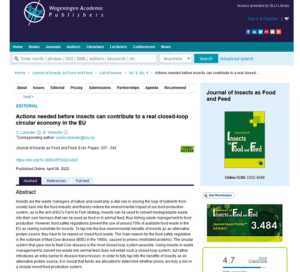In our latest publication Food industry waste – An opportunity for black soldier fly larvae protein production in Tanzania recently published in Science of the Total Environment, we have investigated the potential of food industry waste as substrate for rearing of black soldier fly larvae (BSFL). We first conducted a survey, in which we assessed occurrence of wastes in different food industries in three large cities in Tanzania: Dar-es Salaam, Mwanza and Dodoma. We asked the companies a number of questions related to their current waste management system. Once we had an idea which waste streams that was available, we performed a multi-criteria assessment of the most suitable waste streams for BSFL rearing, taking into both availability (available quantities and potential competing use etcetera) and the physical characteristics of the waste. If you are curious to know which food industries there are, what waste they generate, what they currently do with their waste and which of these waste streams that could be used for BSFL rearing, read our article.
Tag: Organic waste
SLU Youth Institute’s interview with Viktoria can now be seen
The interview Viktoria had (in Swedish!) with SLU Youth Institute about our work on fly larvae composting is now out. In the video below you can see the interview 10 min in.
Mohamad Kentar – New intern at Kretsloppsteknik
 I am originally Syrian and moved to Sweden about six years ago. I could not finish my last year of studying biochemistry at the University of Aleppo because of the war there. But with a lot of optimism and self-challenge, I was finally able to return to the bench of scientific research as a second-year student in the pharmaceutical and food technology at Folkuniversitetet in Uppsala, where my studies covers the entire chain of production from idea to product with hygiene requirements, process technology, process chemistry and knowledge of relevant legislation. With the aim to improve the health and quality of life of the population and work with the sustainable nutrition of the future through qualified practical work in medicine and the food industry.
I am originally Syrian and moved to Sweden about six years ago. I could not finish my last year of studying biochemistry at the University of Aleppo because of the war there. But with a lot of optimism and self-challenge, I was finally able to return to the bench of scientific research as a second-year student in the pharmaceutical and food technology at Folkuniversitetet in Uppsala, where my studies covers the entire chain of production from idea to product with hygiene requirements, process technology, process chemistry and knowledge of relevant legislation. With the aim to improve the health and quality of life of the population and work with the sustainable nutrition of the future through qualified practical work in medicine and the food industry.
Fortunately and with great happiness I was recently accepted as an intern at SLU ,as a laboratory assistant for two and a half months in a project fly larvae composting, where organic waste is converted into animal feed (fly larvae) and organic fertilizer (treatment residues).
Links: mohamad kentar | LinkedIn. E-post: m.kentar86@gmail.com
Video shoot with SLU Youth Institute

To promote SLU Youth Institute and the advantages for high schools becoming part of it, Viktoria Wiklicky was invited to talk about the Black Soldier Flies in their 2022 launching video. Fly larva composting is a tool to close the loop of a now linear food production system and aims to make food production more circular. Promoting the technology to the next generation will ensure that our passion and our ideas will be continued in the future.
SLU Youth Institute aims to create interest among Swedish youth for global food security and to find sustainable solutions to the global challenges based on the UN Sustainable Development Goals. The programme was founded 2020 and is part of the many Youth Institutes coordinated by World Food Prize Foundation. High school students engage with local leaders and experts to discuss critical global challenges, participate in hands-on activities, and explore exciting ways to make a difference in Sweden, across Europe and around the world. By the way, also the larvae showed their best side in the spotlight of the cameras and luckily, cameras cannot record smell (yet).
Visit from the foreign ministry at SLU
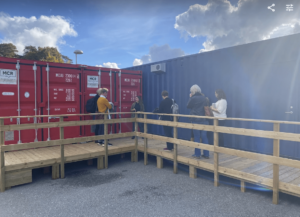
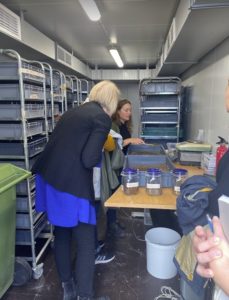
During a visit by two foreign ministry officials, that had a full day at SLU about current research they visited us in the Environmental engineering group. We had interesting discussions about closing the loop of plant nutrients and thereby increasing the resilience while decreasing the environmental pollution. We did also visit our two treatment systems for urine drying and for fly larvae composting and presented our research about producing fertilisers from our wastewater and animal feed from the food waste.
Congratulations to Dr Alice Isibika!
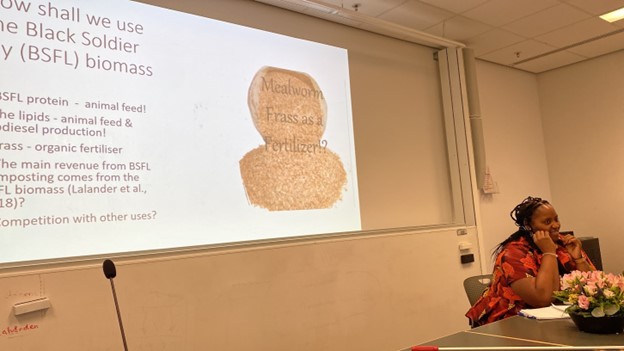
On the 8th of June, Alice Isibika successfully defended her thesis Use of pre-treatments and substrate blending to enhance process efficiency in black soldier fly larvae composting of food industry waste. External reviewer was Professor Sven Gjedde Sommer from Aarhus University (Denmark). The evaluation committee was Associate Professor Lara Maistrello from University of Modena and Reggio Emilia Area San Lazzaro (Italy), Dr Chrysantus Tanga from International Centre of Insect Physiology and Ecology (Kenya) and Docent Maria Westerholm from SLU here in Uppsala. The reserve in the committee was Docent Åke Nordberg from our own department. Alice got a lot of questions from both the opponent and the committee members, and the defense lasted from 1 pm till 4:30 pm. We think Alice did a great job and congratulate her on this achievement. We wish Alice the best of luck in her future endeavors, and hope that she will be able to apply what she studied in her thesis work also in practice when she returns home to Tanzania.
Nailing of Alice Isibika’s PhD thesis!
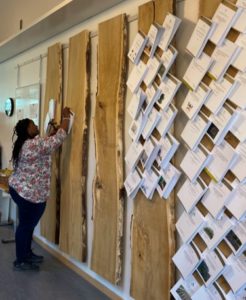 On Wednesday the 18th of May 2022, Alice Isibika nailed her PhD Thesis titled ‘Use of pre-treatments and substrate blending to enhance process efficiency in black soldier fly larvae composting of food industry waste’. Welcome to join her public defence of the Thesis that will take place on 8th of June 2022 at 13.00.
On Wednesday the 18th of May 2022, Alice Isibika nailed her PhD Thesis titled ‘Use of pre-treatments and substrate blending to enhance process efficiency in black soldier fly larvae composting of food industry waste’. Welcome to join her public defence of the Thesis that will take place on 8th of June 2022 at 13.00.
Abstract: Black soldier fly larvae (BSFL) composting is a biowaste treatment that converts biomass into valuable animal protein and fertiliser, but low protein content and complex molecules (e.g. fibre) in substrate reduce BSFL composting efficiency. This thesis evaluated the impact of using pre-treatments and blending substrates on BSFL process efficiency. The feasibility of using BSFL composting to treat available food industry waste streams in Tanzania and physical-chemical characteristics of these wastes were also assessed. The pre-treatments tested were biological, chemical, heat-based, biochemical and combinations of these, while blending involved mixing banana and orange peels with fish waste. All pre-treatments except heating and all substrate blends improved BSFL conversion efficiency in composting. The conversion efficiency was reduced by high concentrations of tannins, phenols, carbohydrates, fibre and fat, but increased by high protein and nitrogen concentrations. The available food industry waste from single companies in Tanzania, in quantities of ~100,000-1,000,000 kg y-1, was not sufficiently nutritionally balanced as a standalone feedstock for BSFL composting. However, with pre-treatment and substrate blending, BSFL composting could be successfully implemented to valorise biowaste streams in cities in low and middle-income countries such as Tanzania and other similar settings globally.
Cecilia joined TABLES seminar on How to squeeze fat into a sustainable food future
On the 13th of April a seminar on How to squeeze fat into a sustainable food future was organised by TABLE and SLU Future Food. Cecilia presented on using insects for fat production. Turns out her insects actually are quite good at synthesising fat; could they play a role in closing the fat gap? The fat gap is the gap between the total amount of fat needed for humanities nutritional needs and how much that is actually being produced. If you want to find out more about this, have a listen to the seminar.
Cecilia presented how insects can be used to link waste management with food production
On the 7th of April Cecilia held a presentation on the SLU lunch seminar series Worth knowing about how waste management can be linked with food production with the help of Insects. The spring lectures in the series can be seen here.
Editorial in Journal of Insects as Food and Feed Vol. 8, No. 4, 2022
This month Kretsloppsteknik’s Cecilia Lalander and Björn Vinnerås published an editorial in Journal of Insects as Food and Feed about the hindrances that exist in the EU that prevent a true insect based closed-loop circular economy in the EU. The opportunity to write an editorial in JIFF comes as of Cecilia being one of the associated editors of the journal. Please, read the full editorial if you want to find out what actions we believe are needed for achieving a circular insect food production system in the EU.
